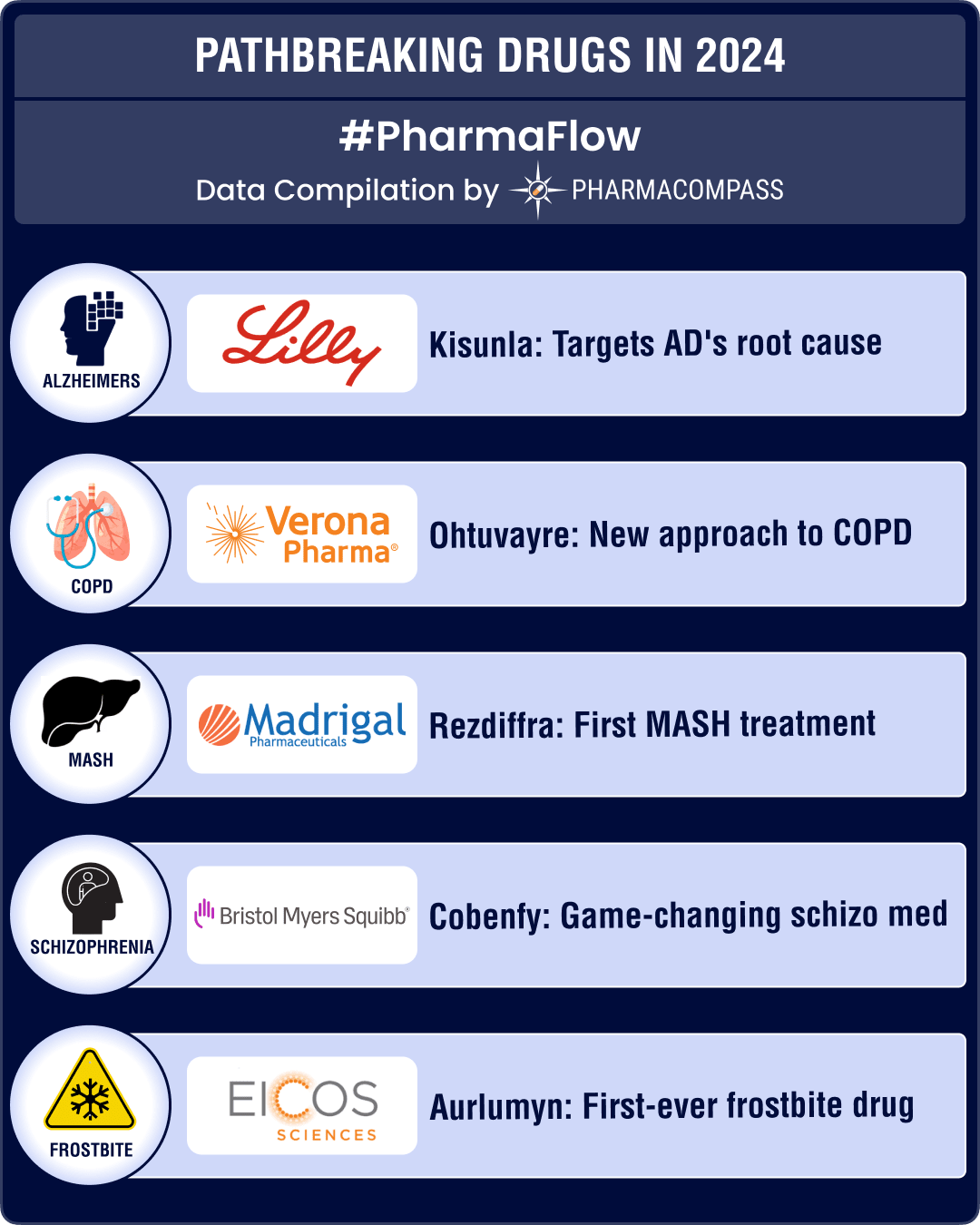
By PharmaCompass
2024-11-14
Impressions: 3354
This year has seen pivotal advancements in medical innovation. The US Food and Drug Administration (FDA) has approved several groundbreaking therapies that promise to transform patient care across multiple therapeutic areas.
Some of the therapies approved have revolutionary delivery mechanisms, while others are first-in-class treatments for previously unaddressed conditions. This week, PharmaCompass brings you a compilation of new pathbreaking approvals of 2024, including advancements in neurology, chronic conditions, mental health conditions, and innovative solutions for various other ailments.
Lilly, Alpha Cognition, BMS transform neurological care with new Alzheimer’s, schizophrenia drugs
The neurological treatment landscape saw several major breakthroughs in 2024, particularly in the treatment of Alzheimer’s disease (AD). Eli Lilly’s Kisunla represents a significant advancement in treating early, symptomatic AD. Following decades of failed efforts, Kisunla’s approval, along with that of Eisai-Biogen’s Leqembi last year, marks a turning point in addressing AD.
The drug works by targeting and clearing beta amyloid plaque from the brain, thereby attacking the disease’s underlying pathology, rather than just managing symptoms. Administered as an infusion every four weeks, Kisunla’s Medicare coverage makes it accessible to patients in the US who desperately need new treatment options.
Alpha Cognition’s Zunveyl emerged as a promising new oral treatment for mild-to-moderate Alzheimer’s-related dementia. Only the second oral AD treatment approved by the FDA in over a decade, Zunveyl is a prodrug, or a biologically inactive compound that can be metabolized by the body to produce a drug. It remains inactive as it passes through the stomach and enhances cholinergic function in the brain.
Perhaps one of the most exciting breakthroughs of 2024 was Bristol-Myers Squibb’s Cobenfy. This revolutionary antipsychotic medication for schizophrenia represents the first novel approach to treatment since the 1950s. Unlike traditional antipsychotics that target dopamine receptors, Cobenfy works through cholinergic receptors, offering new hope to patients who struggle with the side effects of conventional treatments.
Traditional antipsychotics have been associated with several mild and serious side effects such as weight gain, feeling unmotivated and sluggish, high rates of cardiac disease, and even early death. Cobenfy’s innovative mechanism of action has generated excitement in the medical community. Experts project Cobenfy to bring in US$ 7.5 billion in peak annual sales, thereby validating BMS’ recent, US$ 14-billion acquisition of Karuna Therapeutics.
Verona, Sanofi’s drugs revolutionize COPD care; Madrigal’s Rezdiffra offers hope to MASH patients
The landscape of chronic obstructive pulmonary disease (COPD) treatment saw remarkable advances in 2024. Verona Pharma’s Ohtuvayre brings the first new mechanism of action in over two decades for COPD treatment. This dual-action, inhaled medication serves as both a bronchodilator and an anti-inflammatory agent, offering a comprehensive approach to symptom management.
Adding to this progress, Sanofi and Regeneron’s Dupixent achieved a historic milestone by becoming the first biologic approved for treating COPD. Dupixent is Sanofi’s best-selling drug. It is poised to cross over € 21 billion (US$ 23.5 billion) in sales by 2030, with COPD likely to contribute US$ 2.9 billion, predict analysts. Over 390 million people are living with COPD worldwide.
In the field of liver disease, Madrigal Pharmaceuticals’ Rezdiffra became the first FDA-approved treatment for metabolic dysfunction-associated steatohepatitis (MASH) with moderate to advanced liver scarring. This approval represents a breakthrough in a field that has been notorious for being a graveyard for failed programs. Rezdiffra offers hope to patients with this common liver condition, which primarily affects those with obesity or type 2 diabetes. The American Liver Foundation has termed this approval a “game-changing” moment in hepatology.
For the rare disease community, Ipsen’s Iqirvo emerged as the first new medicine approved in nearly a decade for primary biliary cholangitis (PBC). This first-in-class peroxisome proliferator-activated receptor (PPAR) agonist offers new hope for the approximately 100,000 Americans affected by this condition, particularly women aged 30 to 60 years.
A significant breakthrough for patients with hypoparathyroidism came with the approval of Ascendis’ Yorvipath, making it the only treatment for hypoparathyroidism in adults. By directly addressing the underlying hormone deficiency, Yorvipath helps stabilize calcium levels in the blood, reducing the treatment burden associated with managing symptoms through calcium and vitamin D supplements alone.
In the realm of pulmonary medicine, Merck’s Winrevair emerged as the first new therapy for pulmonary arterial hypertension (PAH) in over a decade. As the first approved activin-signaling inhibitor therapy, Winrevair represents a novel approach to treating this rare but severe condition that doctors call a “ticking time bomb”. The drug is the first treatment that targets the underlying cause of the lung condition, which typically leads to death within a decade of diagnosis.
ARS Pharma launches nasal spray alternative to EpiPen, Eicos introduces med for severe frostbite
Leading the charge in innovative drug delivery is ARS Pharma’s Neffy, the first-ever nasal spray alternative to the EpiPen for treating severe allergic reactions. This groundbreaking advancement represents the first major innovation in anaphylaxis treatment in over a decade. For children and individuals with needle phobia, this nasal spray format addresses one of the most significant barriers to timely treatment of allergic emergencies.
Speaking of emergency medicine, Eicos Sciences’ Aurlumyn made history as the first FDA-approved treatment for severe frostbite. This approval fills a critical gap in emergency care, offering a medical intervention that could prevent the need for amputation in severe cases.
The cardiovascular space saw its first oral anti-hypertensive therapy that works through a new therapeutic pathway in almost 40 years. Idorsia’s Tryvio is a treatment for hypertension that offers new hope to patients whose blood pressure remains inadequately controlled on existing medications. Idorsia expects millions of patients to benefit from it.
Our view
This year, the pharmaceutical industry has taken a remarkable leap forward by addressing some of healthcare’s most challenging conditions. Treatments like BMS’ Cobenfy for schizophrenia and Madrigal’s Rezdiffra for MASH demonstrate the industry’s growing ability to translate science into practical therapies. With the growing use of artificial intelligence in the drug industry, we hope that these approvals are just a precursor to a bevy of pathbreaking therapies in the years to come.
The PharmaCompass Newsletter – Sign Up, Stay Ahead
Feedback, help us to improve. Click here
Image Credit : PATHBREAKING DRUGS IN 2024 by PharmaCompass license under CC BY 2.0
“ The article is based on the information available in public and which the author believes to be true. The author is not disseminating any information, which the author believes or knows, is confidential or in conflict with the privacy of any person. The views expressed or information supplied through this article is mere opinion and observation of the author. The author does not intend to defame, insult or, cause loss or damage to anyone, in any manner, through this article.”







